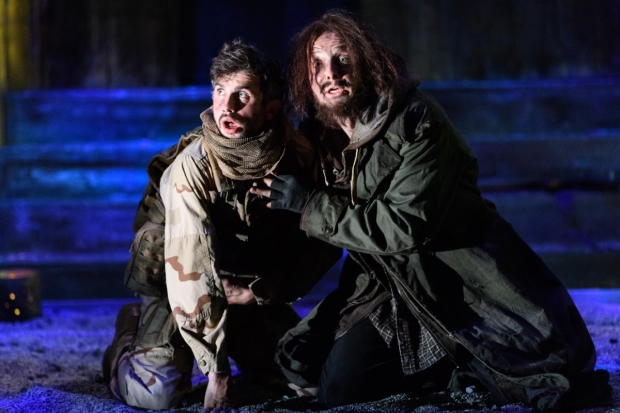Review: Dardanus (Hackney Empire and tour)

© Jane Hobson
English Touring Opera has a new slogan, "Opera that moves", and at the company’s considerable best it’s a message that says it all. They travel to us and they stir us, and no outfit can match them in spreading the gospel of opera. Often surprising, always enterprising, ETO is a vital asset to the nation’s art.
The choice of Rameau’s Dardanus is a case in point, because it’s a seldom-heard rarity (this was my own first encounter with it) and under the baton of Jonathan Williams it offers a feast of exquisite baroque in performances that are mostly excellent. The snag is that it doesn’t live up to the slogan.
The fault – its failure to move us – lies not with Rameau, but with ETO‘s staging of the composer’s final version of his opera, the revision he completed in 1760. Director Douglas Rintoul adds a sandbox to Cordelia Chisholm’s utilitarian tour set (lightly redressed, it also serves Handel’s Giulio Cesare) and sends his singers to play at soldiers inside it. Modern-day boots, guns and military fatigues are more suggestive of stomp-and-yomp than classical civilization.
Then there are the cuts, which help bring the evening in at little more than two hours. Dardanus, a cousin of Romeo and Juliet in its depiction of a young woman who falls in love with her father’s sworn enemy, is an entertainment fleshed out with zesty interventions of dreams, magic and monsters; but most of these have been excised here, perhaps because there’s no one around to dance them in Rintoul’s non-specific war zone.
'Musical pleasures galore'
In one way this may have been a wise decision – the vestigial interludes that remain are poorly staged with weak filler business – but it upsets the opera’s structure, for by setting the opera in a dour present and then stripping away its colours Rintoul has left us with a downbeat experience that only tells half the story. Tenor Anthony Gregory‘s fluent, magnificently rendered account of the title role does not pierce through with sufficient force because it’s too much of a piece with the prevailing mood: gloomy, brooding and a tad slow.
Yet there are musical pleasures galore in this Dardanus. Gregory’s prison aria is a small masterpiece that he sang with great beauty and commitment, and Galina Averina was a vulnerable delight as his beloved Iphise. The excellent Grant Doyle was underemployed as her father, King Teucer, while Alessandro Fisher (Arcas), Eleanor Penfold (Venus) and Frederick Long (Isménor, a prophet and Jay Rayner lookalike) all contributed splendidly sung cameos. Only Timothy Nelson as Iphise’s spurned lover, Anténor, fell short on the opening night with some poor intonation, but I’ve heard him sing well on another occasion so he may have been ailing.
The tireless Old Street Band – what splendid baroque flutes they have! – was supplemented by a tiny four-voice chorus decked out as urban guerillas who brought the onstage contingent to ten. That may not have been sufficient to leaven the gloom or lift the spirits, but what a treat it was to be hearing this music at all – and for it to be so well sung.
Dardanus tours to Oxford, Buxton, Saffron Walden, Snape and Exeter until 7 November.










